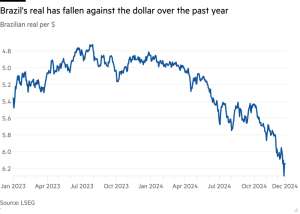A proper breakfast will get children back in schools — and learning
Unlock the Editor’s Digest for free
Roula Khalaf, Editor of the FT, selects her favourite stories in this weekly newsletter.
The writer is the UK’s secretary of state for education
Dallam Primary School lies on the northern edge of Warrington, a side of town with its fair share of social challenges. In years gone by, some children would arrive without having eaten breakfast, leaving them struggling to focus. That was until the school introduced a breakfast club. According to headteacher Amanda Downey, the club has become a cornerstone of the school’s approach to both education and wellbeing, creating the calm and stable environment pupils need to thrive. Data shows that the club has boosted attendance, too.
There’s an important lesson here, because when it comes to education reform, the temptation is to focus solely on the learning — hire more teachers, update the curriculum, improve assessment, tighten accountability. We must and we will do all that. But to benefit fully, we need to make sure children are in school and ready to learn. Without that, we risk building our education system on sand.
Children need to be ready to learn. This is an important part of this government’s “plan for change” and central to our mission to break down the barriers to opportunity, giving every child the best start in life. That’s why we’ve set a milestone for this parliament of a record 75 per cent of five-year-olds reaching a good level of development by the time they reach primary school.
Just as important for transforming life chances is tackling this country’s absence epidemic. One in five children is persistently absent from school, missing a day every other week. That so many children are missing from our classrooms shows the foundations for learning are rotten — and speaks to a wider crisis of belonging.
Part of the solution lies in making schools the centre of their communities. Parents need to believe that their children belong in school, and children need to feel at home there.
That is where breakfast clubs come in. Our manifesto committed us to rolling out free breakfast clubs in every primary school, to make sure that no child begins the school day hungry. But this initiative is designed to deliver much more. I want schools to be places where children eat together, learn together and grow together. Breakfast clubs will help children develop key social skills — and lasting friendships. That sense of belonging is crucial for attendance and attainment, for all children to achieve and thrive — it’s about the club, not just the breakfast.
It’s also about families. Our new breakfast clubs will give parents 30 minutes of free childcare at the start of the day — a step towards ensuring all parents can balance work and family. Schools stand to benefit as well, giving staff a chance to build bonds with their pupils at the beginning of the day.
Feed the future

Support the Financial Literacy and Inclusion Campaign’s joint seasonal appeal with Magic Breakfast
This task is urgent. From April, 750 schools will kick-start our programme, backed by a Budget that tripled investment in breakfast clubs to £33mn
An evaluation for the Magic Breakfast charity, which provides free breakfasts across the school system, found that children aged five to seven gained the equivalent of two months’ extra progress in maths, reading and writing. So it’s great to see Magic Breakfast partnering on the Feed the Future seasonal appeal with the FT’s Financial Literacy and Inclusion Campaign, which does an important job promoting a foundational understanding of finance.
We know that children from disadvantaged backgrounds are more likely to be absent. Breakfast clubs can get more of them back in school, with a nutritious start to the day, so they can concentrate and behave well. This will be even more valuable to the 4.3mn children living in poverty in the UK.
When children are happy, settled and ready to learn, they can focus on science, maths or English and make big strides towards top marks. These breakfast clubs can provide the platform for improved behaviour during lessons — after all, most of us know how difficult it is to behave when we’re hungry.
This article is part of the FT’s Financial Literacy and Inclusion Campaign joint seasonal appeal with Magic Breakfast
#proper #breakfast #children #schools #learning





